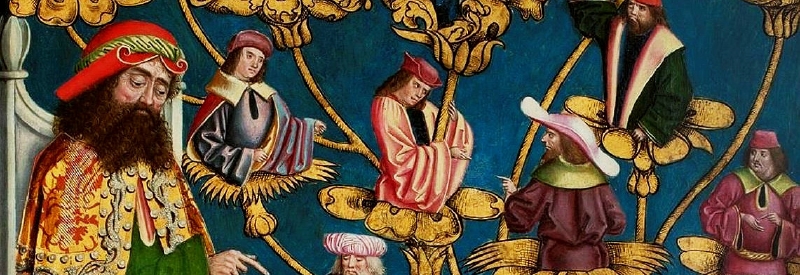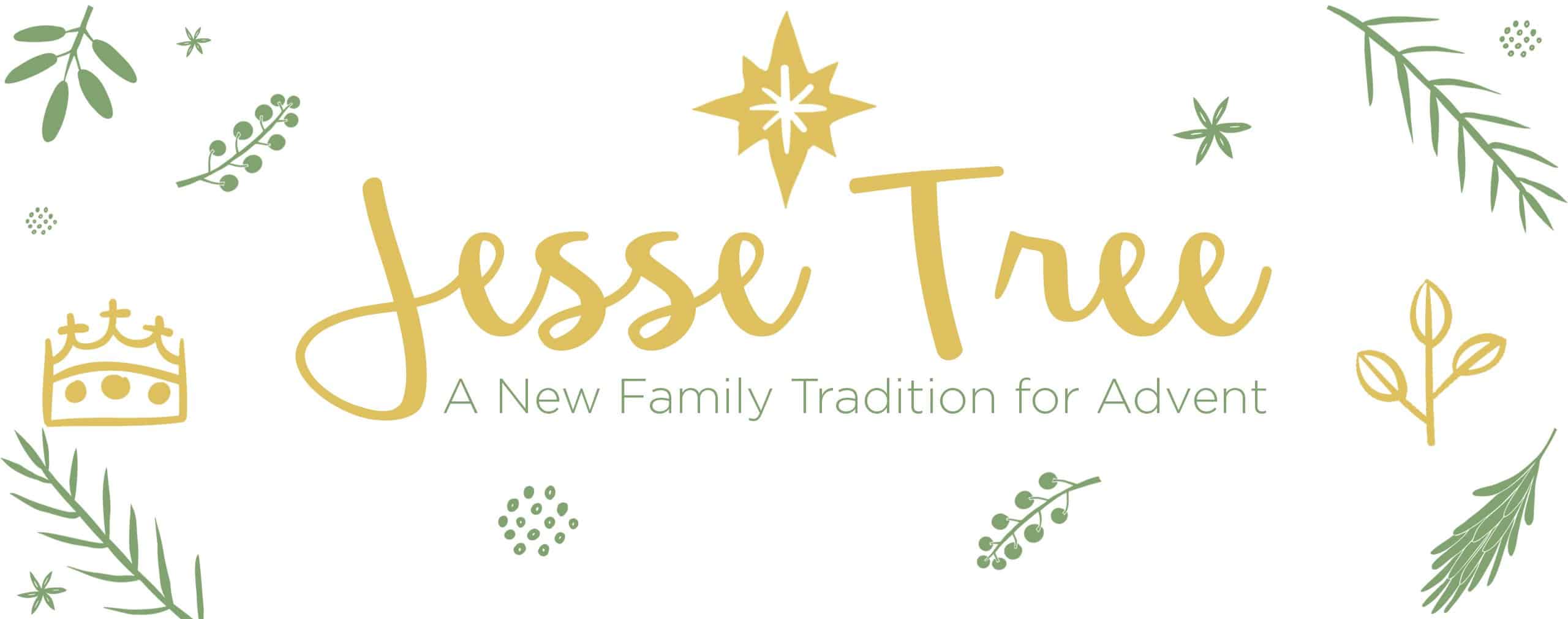
The Jesse tree is a custom of decorating Christmas trees but with ornaments that tell the story of salvation history through our ancestors in faith in the time before Jesus. Their story points ahead to Jesus’ birth. The Jesse tree takes its name from Isaiah 11:1: “A shoot shall come out of the stock of Jesse, and a branch shall grow out of his roots.” Jesse was the father of King David. The ornaments of the Jesse tree highlight the people, prophesies, and events that all point forward to the birth of Christ.
The ornaments tree tell the story of God in the Old Testament, connecting the Advent season with the faithfulness of God across four thousand years of history.
Advent Week 1
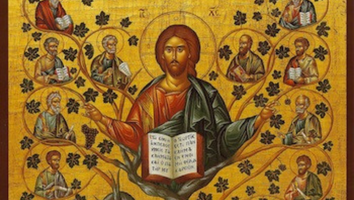
Sunday: The Jesse Tree
The tradition of decorating Christmas trees actually predates the arrival of Christianity in western Europe and was adopted by the early Church. In order to associate the custom more clearly with Christianity, people made Jesse trees—Christmas trees with decorations related to the events of Jesus’ birth and the prophecies about him in the Old Testament. The story of Jesse, the father of David, is told in Isaiah 11:1-10. David’s story is found in 1 Samuel 16:1-13.
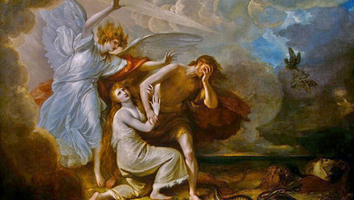
Monday: Adam and Eve
Genesis 3 tells how Adam and Eve’s intimacy with God and with each other is disrupted. The serpent enters the scene. The serpent represents anything that can separate a person from God. The woman, with the man as her silent partner, speaks to the serpent. They examine the possibility of disobeying God. Will Adam and Eve accept God’s moral order and trust in his love? Adam and Eve — Genesis 2:4-24 The Fall of Adam and Eve — Genesis 3
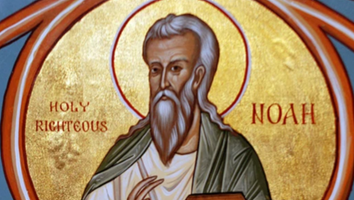
Tuesday: Noah
The story of Noah is told to illustrate how deeply the human family has fallen into sinfulness. Sin is now so universal that a troubled God decides to complete the work of destruction that the human family has begun (Genesis 6:13). However, God sees that Noah is a good man and decides that humanity will survive through Noah’s family. God tells Noah to build an ark, which God will use to save Noah’s family and members of the animal kingdom. Noah and the Flood — Genesis 6-9
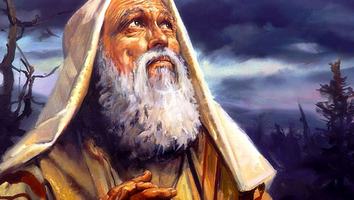
Wednesday: Abraham
Abraham stands before God, facing the future. God had promised that Abraham would be the father of many descendants, but his wife, Sarah, seems unable to have children. So Abraham believes he will die childless and that his steward, Eliezer, will be his heir. God assures Abraham that this will not happen, promising Abraham that he will have a son with Sarah. More than that, the descendants of Abraham will be as numerous as the stars in the sky. The Call of Abraham — Genesis 12. God’s Covenant with Abraham — Genesis 15

Thursday: Isaac
Then, unexpectedly, God sends an angel with the message that Abraham must sacrifice his son Isaac. As bitter as the message is, and as hopeless as it makes Abraham feel, he obeys without hesitation. He gathers his servants and Isaac with wood for the sacrifice and sets out to the appointed place. The last part of the way he goes alone with Isaac, who is made to carry the wood for his own sacrifice. On the way, Isaac asks his father what animal will be sacrificed. Abraham answers that God will provide. Abraham and Isaac — Genesis 22
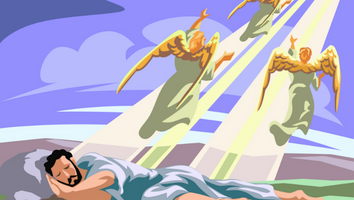
Friday: Jacob
While on his journey, Jacob receives a divine revelation in a dream. He sees a ladder going up from earth to heaven. On the ladder are angels, roaming up and down, patrolling the earth and reporting back to God. In his vision, Jacob meets God. God confirms the covenant made to Abraham and to Isaac that their ancestors will be as plentiful as the dust on the ground and will spread from east to west. Jacob will also receive God’s protection wherever he goes. Jacob’s Vision of God — Genesis 28:10-22
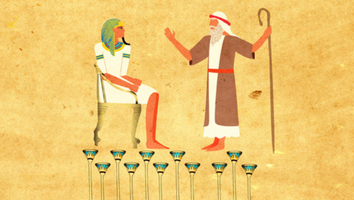
Saturday: Joseph
Joseph interprets Pharaoh’s dreams of the coming famine. Pharaoh appoints Joseph vizier, second in authority only to Pharaoh himself, to carry out the plan. Joseph marries an Egyptian woman and has two sons. The first he names Manasseh (“forgotten”), to show that his previous suffering has been forgotten. The second is Ephraim (“God has made me fruitful”). Joseph and His Brothers — Genesis 37 Joseph and Pharaoh — Genesis 39-41 Joseph and His Brothers Are Reconciled — Genesis 42-45
Advent Week 2
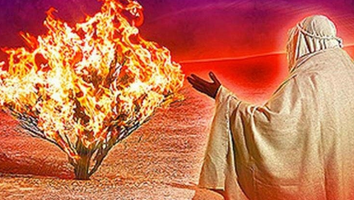
Sunday: Moses & the Burning Bush
Encountering a burning bush (Exodus 3), Moses wants to know who is there. God answers Moses, “I am who I am”. He is the beginning of all things and the completion of all things. “And he said, ‘I will make all my goodness pass before you, and will proclaim before you the name, “The Lord”; and I will be gracious to whom I will be gracious, and will show mercy on whom I will show mercy’” (Exodus 33:19).
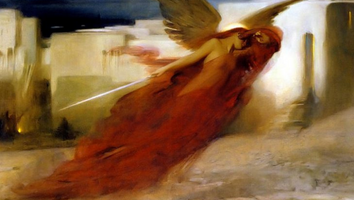
Monday: The People of God
Pharoah holds Isrel captive. God tells Moses that a lamb be sacrificed and the blood of the lamb be put on the doorframes of the houses. This will be a sign to the Angel of Death to “pass over” the houses of the Israelites (Exodus 11-13). Egyptian houses are filled with mourning, “for there was not a house without someone dead” (Exodus 12:30). Pharaoh, finally convinced that he cannot defeat the God of Moses, lets the people go.
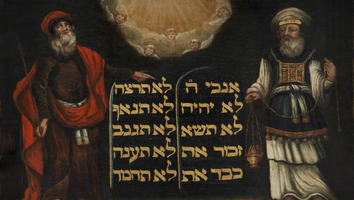
Tuesday: Moses and Aaron
On Mount Sinai, God first reminds Moses and Aaron what he has done for them: “I am the LORD your God, who brought you out of the land of Egypt, out of the house of slavery” (Exodus 20:2). He then gives them the 10 commandments – the start of how to live in relationship with God and one another. The Hebrews Meet God at Sinai — Exodus 19 The Ten Commandments — Exodus 20:1-11

Wednesday: Joshua
Joshua led the Hebrew people from success to success in conquering the land of Canaan. The biblical writer attributes this to his obedience and faithfulness to God. The Canaanite people were defeated, their cities were destroyed, and the spoils of war were offered to God. Like Moses, Joshua was successful until his death, at the age of 110, the same age of Joseph at his death. Rahab and the Fall of Jericho — Joshua 2; 6 Joshua Renews the Covenant — Joshua 23-24

Thursday: Gideon
Gideon is a farmer. When God tells him that he will lead the Hebrew people against their enemies, Gideon laughts and asks if this is how God is prepared to keep his promises. God gives the task to Gideon and promises that he will be with him. Gideon has doubts because his tribe is small and he won’t be able to raise a large army. God wants to emphasize that when victory comes, it comes from God. The Hebrew people will never win if they depend on themselves. Judges 6-8
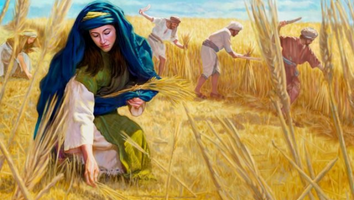
Friday: Ruth
Naomi, an Israelite living in a foreign land, returns home when her husband dies. She tells her daughters-in-law to return to the protection of their own families. Ruth stays with Naomi and asks not to be separated from her. Ruth remains faithful leaving her home to go to Israel. While Ruth is working in the fields, she meets Boaz, the landowner, who is attracted to her and hears her story. Moved in his heart, he tells his workers to make sure that Ruth has plenty of grain to gather. The story of Naomi and Ruth is found in Ruth
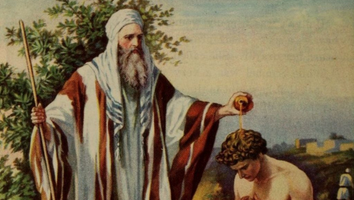
Saturday: Samuel
Saul is a member of the tribe of Benjamin, the smallest of the tribes. His father, a wealthy man, loses a number of donkeys. Saul goes in search of them but cannot find them. Told of a holy man in a nearby town, Saul goes to see him to ask if he can help Saul find the donkeys. When Samuel sees Saul, he realizes that Saul is the man God has told him about in a dream; the man who will help free the people from the Philistines. God Calls to Samuel — 1 Samuel 3 Samuel and Saul — 1 Samuel 10-12
Advent Week 3
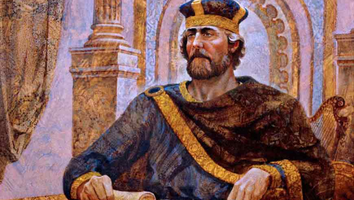
Sunday: David - Shepherd and King
David, a shepherd, a warrior, and the King who united all the tribes of Isreal with Jerusalem as the united capital. A holy man whose faith in God was deep and rich. His legacy of Psalms extrol God has his rock, his fortress, and savior. Yet he was deeply flawed and sinned before God – and repented to his God. It is to David was given the Covenant of Kinship. He was the greatest king of Isreal and the measure of all the other kings.
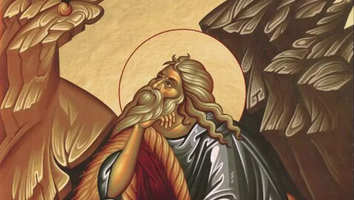
Monday: The Prophet Elijah
After the time of David, the united Kingdom fell apart. King Ahab and Queen Jezebel were leading the Israelites away from the covenant with God. The prophet Elijah was called to call the nation back to God. Despite threats against his life, Elijah fulfills his prophetic role even knowing the likely end. Elijah is the great prophet who will appear with Moses at Jesus’s Transfiguration. He is the measure of all the prophets.
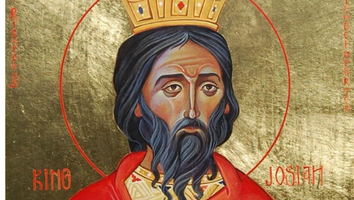
Tuesday: King Josiah
Josiah is considered a great king who “walked in all the way of David his father, and turned not aside to the right hand or to the left” (2 Chron 22)” Josiah restored the Temple and its rituals, proclaimed the Torah and Covenant to the people reminding them that God alone is One and there are no others. Despite the legacy of kings who came before him, he did not shy away from what was his to do. He died in defense of his people
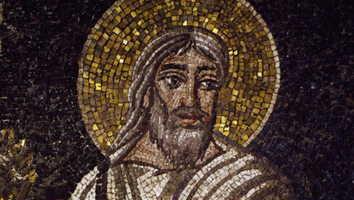
Wednesday: The Prophet Isaiah
The prophet Isaiah was council to Josiah and all the kings up to the exile in Babylon. Isaiah is called and he hears the voice of the Lord saying, “Whom shall I send, and who will go for us?” And Isaiah replies, “Here am I; send me!” (Isaiah 6:8). He is the prophet who proclaims the universality of the mission of the Messiah to all people. He is the one who Jesus quotes when he declares: “The Spirit of the Lord is upon me because he has anointed me to bring glad tidings to the poor” (Luke 4:18)
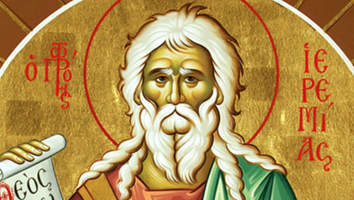
Thursday: The Prophet Jeremiah
Jeremiah preached in Jerusalem over a 30 year period. He preached against the kings and the people who did not care for the widows, orphans and the aliens among them. “Here you are, trusting in deceptive words to no avail. Will you steal, murder, commit adultery, swear falsely, make offerings to Baal, and go after other gods that you have not known” (Jer 7:8-11) Even as Jerualem falls to the armies of Babylong, Jeremiah points to the days ahead when they will be redeemed and return to the land of their ancestors (Jer 29 and following)
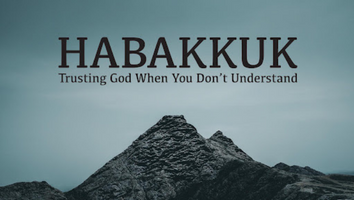
Friday: The Prophet Habakkuk
Habakkuk is the only prophet to devote his entire work to the question of the justice of God’s government of the world. He does not understand God’s will, yet he stands ready to hear what God has planned. God assures Habakkuk that no matter what seems to be happening on the surface, God’s ultimate plan for the Judeans who live in faithfulness will not be delayed. “For there is still a vision for the appointed time; it speaks of the end, and does not lie. If it seems to tarry, wait for it; it will surely come, it will not delay” (Habakkuk 2:3).

Saturday: Nehemiah
Nehemiah was the good steward who received permission from the Persian King to return to Jerusalem from Exile to fortify Jerusalem. He served as governor of Judah and was a man of good practical sense combined with deep faith in God. He used his influence as governor of Judah to serve God and the fledgling Jewish community in Jerusalem. Working alongside Ezra, as the walls were not strengthened, the two worked to stregthen the faith of the people and return them to life within the covenant.
Advent Week 4
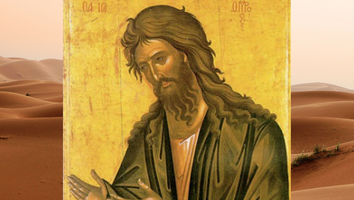
Sunday: John the Baptist
John was the son of Elizabeth and Zechariah and a “cousin” to Jesus. Of him, Jesus said: “Among those born of women no one has arisen greater than John the Baptist” (Matthew 11:11). John’s role to serve as herald to the Messiah. His ministry at the Jordan River called people to return to the Covenant as a people of God – a ministry of repentence. He was a feiry prophet who bold proclaimed God and God’s mercy.

Tuesday: Zechariah
Zechariah, father of the Baptist, was serving as priest in the Temple. When the angel revealed to aged Zechariah that he would have a son, Zechariah asked for proof. As a result, he was silenced. When the son was born, in obedience to God’s word, he named the child John. His silence was lifted and he praised God with the prayer known today as the Benedictus, always part of morning prayer in the Divine Office.
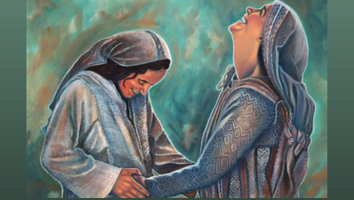
Monday: Elizabeth
Elzabeth was Mary’s relative who lived in the hill country near Jerusalem. After the annunciation, when Elizabeth heard Mary’s greeting, the infant leaped in her womb, and Elizabeth, filled with the holy Spirit, cried out in a loud voice and said, “Most blessed are you among women, and blessed is the fruit of your womb. And how does this happen to me, that the mother of my Lord” should come to me? (Luke 1:41 and following)
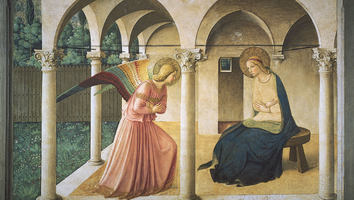
Wednesday: The Virgin Mary
In the sixth month, the angel Gabriel was sent from God to a town of Galilee called Nazareth, to a virgin betrothed to a man named Joseph, of the house of David, and the virgin’s name was Mary. And coming to her, he said, “Hail, favored one! The Lord is with you.” (Luke 1) Mary’s reply was “Behold, I am the handmaid of the Lord. May it be done to me according to your word.” Then the angel departed from her. Her “yes” resonated across all Salvation History for of this one was to be born the Savior of the World and the the fulfillment of the prophets.

Thursday: St. Joseph
In Matthew 1:18-25 Joseph ponders how to deal with Mary’s pregnancy. Joseph is a faithful man yet he does not want to endanger Mary, so he intends to quietly divorce her. In a dream he heard from the angel the good news and true identity of Jesus. And so began his role as father: protector against the rage of Herod. The one responsible to raise the boy in the tradition of the fathers and prophets. The one to teach his son a trade and prepare him for life. The one who played his part in the great unfolding of God’s plan of savlation.
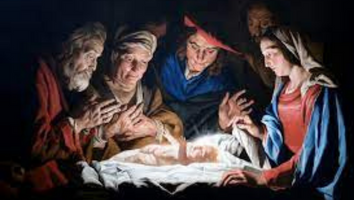
Friday: The Nativity
Jesus is not born at the center of worldly power, rather on extreme margins among the poor, alienated, and oppressed. He is wrapped in swaddling clothes as a sign of his humanity. Jesus is laid in a manger, a feeding trough for animals, as a sign that Jesus is to be food for the world. The first proclamation of the Savior to the shepherds (Luke 2:8-14). Shepherds lived on the margins and were not well respected by society, yet they are the first to hear of the Messiah and the first to celebrate his birth.
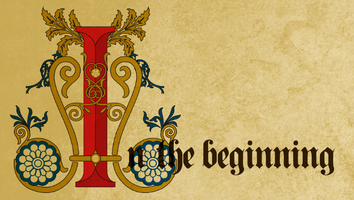
Saturday: the Word
“In the beginning was the Word, and the Word was with God, and the Word was God. He was in the beginning with God. All things came to be through him, and without him nothing came to be. What came to be through him was life, and this life was the light of the human race, the light shines in the darkness and the darkness has not overcome it….And the Word became flesh and made his dwelling among us and we saw his glory , the glory as of the Father’s only Son, full of grace and truth” (John 1:1-6, 14)
